Market Versus Society: Anthropological Insights » książka
topmenu
Market Versus Society: Anthropological Insights
ISBN-13: 9783030089313 / Angielski / Miękka / 2018 / 333 str.
Kategorie:
Kategorie BISAC:
Wydawca:
Palgrave MacMillan
Seria wydawnicza:
Język:
Angielski
ISBN-13:
9783030089313
Rok wydania:
2018
Dostępne języki:
Numer serii:
000764257
Ilość stron:
333
Waga:
0.41 kg
Wymiary:
21.08 x 21.08 x 1.52
Oprawa:
Miękka











